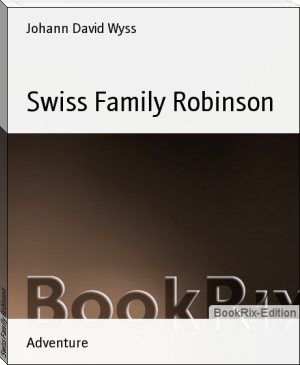Swiss Family Robinson - Johann David Wyss (poetry books to read txt) 📗

- Author: Johann David Wyss
- Performer: -
Book online «Swiss Family Robinson - Johann David Wyss (poetry books to read txt) 📗». Author Johann David Wyss
complete, even to a couple of small brass guns. This was a great
discovery, and I hastened to see if the lad was right. Indeed he was,
but my pleasure was qualified by a sense of the arduous task it would
be to put such a craft together so as to be fit for sea.
For the present, we had barely time to get something to eat and hurry
into the boat, where were collected our new acquisitions, namely, a
copper boiler, iron plates, tobacco-graters, two grindstones, a small
barrel of powder, and another of flints, two wheelbarrows besides
Jack’s, which he kept under his own especial care.
As we drew near the shore, we were surprised to see a number of little
figures ranged in a row along the water’s edge, and apparently gazing
fixedly at us. They seemed to wear dark coats and white waistcoats, and
stood quite still with their arms dropping by their sides, only every
now and then one would extend them gently, as though longing to embrace
us.
`Ah! Here at last come the pigmy inhabitants of the country to welcome
us!’ cried I, laughing.
`Oh, father!’ exclaimed Jack, `I hope they are Lilliputians! I once
read in a book about them, so there must be such people you know, only
these look rather too large.’
`You must be content to give up the Lilliputians and accept penguins,
my dear Jack,’ said I. `We have not before seen them in such numbers,
but Ernest knocked one down, if you remember, soon after we landed.
They are excellent swimmers, but helpless on land, as they can neither
fly nor run.’
We were gradually approaching the land as I spoke, and no sooner was
the water shallow, than out sprang Jack from his tub, and wading
ashore, took the unsuspecting birds by surprise, and with his stick
laid half a dozen, right and left, either stunned or dead at his feet.
The rest escaped into the water, dived, and disappeared.
As these penguins are disagreeable food, on account of their strong
oily taste, I was sorry Jack had attacked them; but going to examine
them when we landed, some of the fallen arose from their swoon, and
began solemnly to waddle away, upon which we caught them, and tying
their feet together with long grass, laid them on the sand to wait
until we were ready to start.
The three wheelbarrows then each received a load, the live penguins
seated gravely were trundled along by Jack, and away we went at a great
rate.
The unusual noise of our approach set the dogs barking furiously, but
discovering us, they rushed forward with such forcible demonstrations
of delight, that poor little Jack, who, as it was, could scarcely
manage his barrow, was fairly upset, penguins and all. This was too
much for his patience, and it was absurd to see how he started up and
cuffed them soundly for their boisterous behaviour.
This scene, and the examination of our burdens, caused great
merriment: the tobacco-grater and iron plates evidently puzzling
everybody.
I sent the boys to catch some of our geese and ducks, and bid them
fasten a penguin to each by the leg, thinking that it was worth while
to try to tame them.
My wife had exerted herself in our absence to provide a good store of
potatoes, and also of manioc root. I admired her industry, and little
Franz said, `Ah, father! I wonder what you will say when mother and I
give you some Indian corn, and melons, and pumpkins and cucumbers!’
`Now, you little chatterbox!’ cried she. `You have let out my secret! I
was to have the pleasure of surprising your father when my plants were
growing up.’
`Ah, the poor disappointed little mother!’ said I. `Never mind! I am
charmed to hear about it. Only do tell me, where did those seeds come
from?’
`Out of my magic bag, of course!’ replied she. `And each time I have
gone for potatoes, I have sown seeds in the ground which was dug up to
get them; and I have planted potatoes also.’
`Well done, you wise little woman!’ I exclaimed, `Why, you are a model
of prudence and industry!’
`But,’ continued she, `I do not half like the appearance of those
tobacco-graters you have brought. Is it possible you are going to make
snuff? Do, pray, let us make sure of abundance of food for our mouths,
before we think of our noses!’
`Make your mind easy, my wife. I have not the remotest intention of
introducing the dirty, ridiculous habit of snuffing into your family!
Please to treat my graters with respect, however, because they are to
be the means of providing you with the first fresh bread you have seen
this many a long day.’
`What possible connection can there be between bread and
tobacco-graters? I cannot imagine what you mean, and to talk of bread
where there are no ovens is only tantalizing.’
`Ah, you must not expect real loaves,’ said I. `But on these flat iron
plates I can bake flat cakes or scones, which will be excellent bread;
I mean to try at once what I can do with Ernest’s roots. And first of
all, I want you to make me a nice strong canvas bag.’
This my wife willingly undertook to do, but she evidently had not much
faith in my powers as a baker, and I saw her set on a good potful of
potatoes before beginning to work, as though to make sure of a meal
without depending on my bread.
Spreading a large sailcloth on the ground, I summoned my boys and set
to work. Each took a grater and a supply of well-washed manioc root,
and when all were seated round the cloth—`Once, twice, thrice! Off!’
cried I, beginning to rub a root as hard as I could against the rough
surface of my grater. My example was instantly followed by the whole
party, amid bursts of merriment, as each remarked the funny attitude
and odd gestures of his neighbours while vehemently rubbing, rasping,
grating and grinding down the roots allotted to him. No one was tempted
by the look of the flour to stop and taste it, for in truth it looked
much like wet sawdust.
`Cassava bread is highly esteemed in many parts of the New World, and I
have even heard that some Europeans there prefer it to the wheaten
bread of their own country. There are various species of manioc. One
sort grows quickly, and its roots ripen in a very short time. Another
kind is of somewhat slower growth. The roots of the third kind do not
come to maturity for two years. The two first are poisonous, if eaten
raw, yet they are preferred to the last, which is harmless, because
they are so much more fruitful, and the flour produced is excellent, if
the scrapings are carefully pressed.’
`What is the good of pressing them, father?’ inquired Ernest.
`It is in order to express the sap, which contains the poison. The dry
pith is wholesome and nourishing. Still, I do not mean to taste my
cakes, until I have tried their effect on our fowls and the ape.’
By this time our supply of roots being reduced to damp powder, the
canvas bag was filled with it, and tying it tightly up, I attempted to
squeeze it, but soon found that mechanical aid was necessary in order
to express the moisture.
My arrangements for this purpose were as follows. A strong straight
beam was made flat on one side, smooth planks were laid across two of
the lower roots of our tree; on these we placed the sack, above the
sack another plank, and over that the long beam; one end was passed
under a root near the sack, the other projected far forward. And to
that we attached all the heaviest weights we could think of, such as an
anvil, iron bars and masses of lead. The consequent pressure on the bag
was enormous, and the sap flowed from it to the ground.
`Will this stuff keep any time?’ inquired my wife, who came to see how
we were getting on. `Or must all this great bagful be used at once? In
that case we shall have to spend the whole of tomorrow in baking
cakes.’
`Not at all,’ I replied, `once dry, the flour in barrels will keep
fresh a long time. We shall use a great deal of this, however, as you
shall see.’
`Do you think we might begin now, father?’ said Fritz.
`There does not seem the least moisture remaining.’
`Certainly,’ said I. `But I shall only make one cake today for an
experiment; we must see how it agrees with Master Knips and the hens
before we set up a bakehouse in regular style.’
I took out a couple of handfuls of flour for this purpose, and with a
stick loosened and stirred the remainder, which I intended should again
be pressed. While an iron plate placed over a good fire was getting
hot, I mixed the meal with water and a little salt, kneaded it well,
and forming a thick cake, laid it on the hot plate when, one side
presently becoming a nice yellow brown colour, it was turned and was
quickly baked.
It smelt so delicious, that the boys quite envied the two hens and the
monkey, who were selected as the subjects of this interesting
experiment, and they silently watched them gobbling up the bits of cake
I gave them, until Fritz turned to me, saying, `Suppose the cake is
poisonous, what effect will it have on the creatures? Will they be
stupefied, or will they suffer pain?’
`That depends upon the nature of the poison. Some cause violent pain,
as colchicum, hellebore, and aconite. Others produce stupefaction and
paralysis, as opium, hemlock, and prussic acid; while others again, as
strychnine, are followed by violent convulsions, or, as belladonna, by
delirium.
`The effects of course vary according to the quantity taken, and such
remedies should be applied as will best counteract the effect of each
poison: emetics in any case, to remove as much as possible of the
noxious substance, combined with oils and mucilaginous drinks to soothe
and protect the stomach in the case of irritants; stimulants, such as
spirits, ammonia, or strong coffee to rouse from the stupor of the
narcotics; and sedative drugs, which are perhaps in themselves poisons,
to counteract the over stimulation of the nerves caused by the
convulsant poisons.
`But now let us think no more of poisons; here is supper ready and we
need not be afraid to eat roast penguin and potatoes.’
No sooner said than done; we left the fowls picking up the least crumb
they could find of the questionable food, and assembled to enjoy our
evening meal of roast penguin. The potatoes were as usual excellent,
the penguin really not so bad as I expected, although fishy in taste
and very tough.
Next morning every one expressed the tenderest concern as to the
health of Knips and the hens; and lively pleasure was in every
countenance when Jack, who ran first to make the visit of inquiry,
brought news of their perfect good health and spirits.
No time was now to be lost, and bread-baking commenced in earnest. A
large fire was kindled, the plates heated, the meal made into cakes,
each of the boys busily preparing his own, and watching the baking most
eagerly. Mistakes occurred, of course, some of the bread was burnt,
some not done enough; but a pile of nice tempting cakes was at length
ready,





Comments (0)